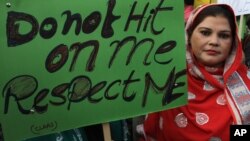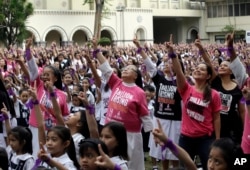Researcher Henriette Jansen was running a workshop in Southeast Asia on the best ways to survey women about domestic violence when one participant had an epiphany.
Interviewers in the participant's country had questioned women on their experience of domestic violence while their husbands were present, and they found only 3 percent of women had ever suffered physical or sexual violence.
The figure was at odds with other surveys in the region showing that 15 percent to 68 percent of women had experienced violence in their lifetimes, and the World Health Organization estimate that a third of women globally had been subjected to violence.
"The interviewers were not trained about ethics, safety, confidentiality, building a rapport with the women," Jansen, an expert on violence against women at the U.N. Population Fund (UNFPA), told the Thomson Reuters Foundation.
"Only women interview women — they have to have the right attitude, not be judgmental, not react in a certain way. If you are judgmental, the respondent will shut up and not say any more."
Beaten for participating
Jansen had also heard reports of women being beaten by their husbands for taking part in similar surveys on domestic violence.
To address such safety and ethics issues, UNFPA and the Australian government on Wednesday launched a program to train researchers and field workers in the Asia-Pacific region to collect and analyze data on the violence that women experience.
Until the 1990s, very little was known about what was happening to women in the home, with the exception of countries such as the United States, Canada and Australia, said Ingrid FitzGerald, a gender and human rights adviser at UNFPA.
"In the developing world, there was no data about violence against women," FitzGerald said, noting that most violence against women is domestic violence.
As a result, violence against women was excluded from the U.N. Millennium Development Goals (MDGs) — targets to address extreme poverty and inequality around the world by 2015.
"Violence was not included because it couldn't be measured in enough countries with comparable data," FitzGerald said.
There is more data available now, she said, and with the new Sustainable Development Goals target to "eliminate all forms of violence against all women and girls" by 2030, countries will collect even more.
'Painful secrets'
The initiative of the UNFPA Asia-Pacific office and Australian Department of Foreign Affairs and Trade aims to create a network of researchers who understand how to measure violence against women, and to make the survey tools and methodology open-source.
The initiative will also help countries use the data for policy and behavior change aimed at ending violence against women.
Jansen said that so far, 28 countries in the Asia-Pacific region have data on violence against women, and the UNFPA project will expand that to 40 by the end of 2019.
Yet no matter how well-trained interviewers are, Jansen said, the statistics still miss the most serious cases: women who have been slain, hospitalized because of injuries, or institutionalized because they have been incapacitated.
"We never get the women who have been locked up, who can't open the doors, who are afraid to open the doors. You can see them during the interviews, [fearing] that their husbands can come home at any moment.
"The interviewer says, 'I'm sure there was something the matter, you could see she was scared,' " she said. "You can never force women to tell their deepest, most painful secrets. ... You never get the truth — you always miss a portion. What you get is always an underestimate."













